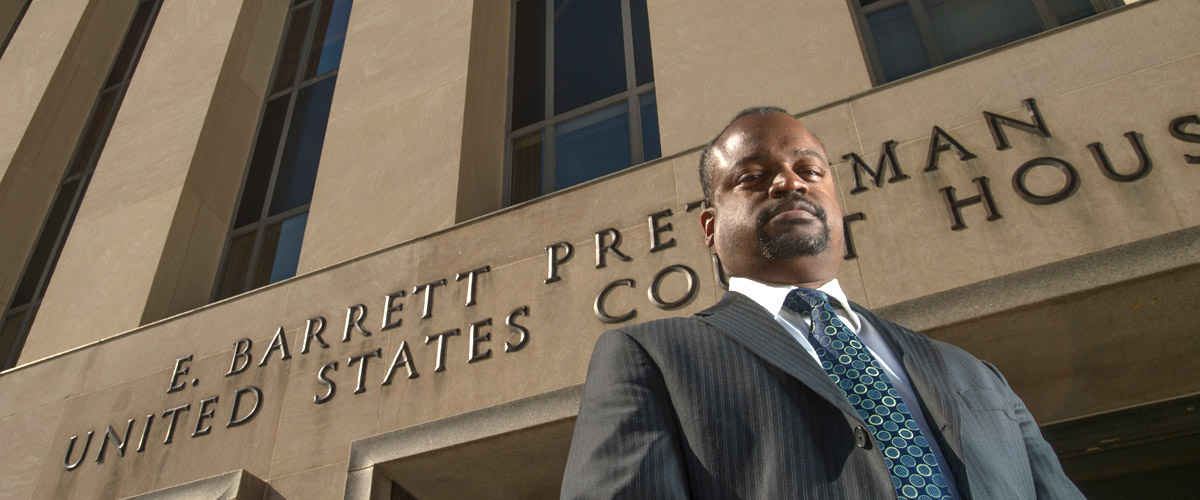Robert Wilkins’ Heritage, Career Filled with Hard Truths
The 1986 chemical engineering alumnus’ great-great-great-great grandmother, Edy, was born in the early 1800s when the original U.S. Constitution permitted slavery, a brutal and racist system in which America’s forefathers commonly referred to Blacks as “other persons.” As a teenager, Edy was raped by a white man, and her child was sold away from her, and she was separated from her parents and other siblings.
Nearly two centuries and six generations later, Wilkins found himself a victim of racism after being profiled by the Maryland State Police in a late-night traffic stop while returning from a family funeral. Despite repeated objections, his car was subjected to a drug-sniffing dog search. Nothing was found and after a lengthy wait, the family was allowed to continue on their journey home. Later, Wilkins became the lead plaintiff and co-counsel in a landmark civil rights lawsuit against the State of Maryland that inspired nationwide reform of police stop-and-search practices and new law enforcement policies to combat racial discrimination.
“The lawsuit was an opportunity to take a negative experience and turn it into something positive,” he states.
Wilkins spent several years defending the rights of Americans as a public defender for the District of Columbia and founded the D.C. Access to Justice Commission as a partner for the community’s distinguished Venable law firm. And, since 2010 he has been using the Constitution as the backbone to decide federal law cases, first as a federal district judge and now as a panelist on the U.S. Court of Appeals for the District of Columbia Circuit.
U.S. Court of Appeal for the District of Columbia
Judge Wilkins is one of 11 members of a court that’s second only to the U.S. Supreme Court in prestige within the American judicial system because of its jurisdiction in cases pertaining to the U.S. Congress and government agencies. It is the main appellate court for issues of American administrative law and constitutional law and has produced several Supreme Court justices, including three current members.
“Every week, there is some aspect of technology or science that I have to delve into for a case, and that’s when I rely on the problem-solving skills that I developed as an engineer,” states Wilkins, reflecting back to past court decisions involving international satellites, mining and telephone regulations, and helicopter design. “I also rely upon the analytical framework I learned at Rose-Hulman. It definitely affects how I look at the law and how I deal with legal issues. I try to sort through the law to determine what the rule is. To the extent that I can help formulate a clear rule, I think my training as an engineer pushes me to do so.”
National Museum of African American History and Culture
Wilkins also has found that being an engineer is an advantage in the political realm. For example, he took an objective, analytical approach to successfully lobbying for the Smithsonian Institution to create the National Museum of African American History and Culture, which opened in the nation’s capital in September 2016.
“Lots of people had worked on trying to make the museum happen for decades. When I got interested in the issue, the first thing I did, using my engineering training, was to study those efforts and determine what went wrong so we could change our approach and get it right this time,” Wilkins says.
He recounted the struggles in the book “Long Road to Hard Truth: The 100 Year Mission to Create the National Museum of African American History and Culture” and in Black history presentations throughout the country. He now has turned attention to telling the story about Edy’s successful fight for her freedom in an upcoming book.
“In spectacular fashion, the museum covers over 500 years of history, documenting the contributions of African Americans to this great nation, as well as their quest for freedom and full citizenship,” he says. “In doing so, the museum portrays some of the evils of our nation, including slavery, lynching, and segregation. Hard truths are on full display. And so are the difficult questions raised by those truths.”
Then, Wilkins remarks, “America’s future depends upon its ability to confront the hard truths posed by the countless stories of children like Edy, and we Americans must answer the vexing question: Why and how were these and so many other injustices allowed to happen over centuries in the United States, and where do we go from here?”
From Muncie to Washington, D.C.

Lauren
Biomedical Engineering and Engineering Management alumna with a passion for travel.


